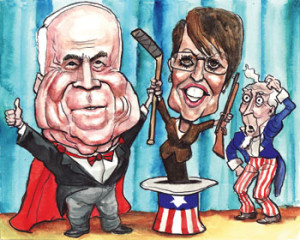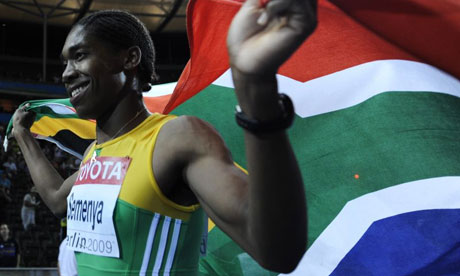 Lexington
Lexington
The woman from nowhere
Sep 4th 2008
From The Economist print edition
John McCain’s choice of running-mate raises serious questions about his judgment
Illustration by KAL
THE most audacious move of the race so far is also, potentially, the most self-destructive. John McCain’s choice of Sarah Palin as his running-mate has set the political atmosphere alight with both enthusiasm and dismay.
Mr McCain has based his campaign on the idea that this is a dangerous world—and that Barack Obama is too inexperienced to deal with it. He has also acknowledged that his advanced age—he celebrated his 72nd birthday on August 29th—makes his choice of vice-president unusually important. Now he has chosen as his running mate, on the basis of the most cursory vetting, a first-term governor of Alaska.
The reaction from inside the conservative cocoon was at first ecstatic. Conservatives argued that Mrs Palin embodies the “real America”—a moose-hunting hockey mum, married to an oil-worker, who has risen from the local parent-teacher association to governing the geographically largest state in the Union. They praise her as a McCain-style reformer who has taken on her state’s Republican establishment and has a staunch pro-life record (her fifth child has Down’s syndrome). Who better to harpoon the baby-murdering elitists who run the Democratic Party?
Mrs Palin was greeted like the reincarnation of Ronald Reagan by the delegates, furious at her mauling at the hands of the “liberal media”. And she delivered a tub-thumping speech, underlining her record as a reforming governor and advocate of more oil-drilling, and warning her enemies not to underestimate her (“the difference between a hockey mum and a pitbull—lipstick”). But once the cheering and the chanting had died down, serious questions remained.
The political calculations behind Mr McCain’s choice hardly look robust. Mrs Palin is not quite the pork-busting reformer that her supporters claim. She may have become famous as the governor who finally killed the infamous “bridge to nowhere”—the $220m bridge to the sparsely inhabited island of Gravina, Alaska. But she was in favour of the bridge before she was against it (and told local residents that they weren’t “nowhere to her”). As mayor of Wasilla, a metropolis of 9,000 people, she initiated annual trips to Washington, DC, to ask for more earmarks from the state’s congressional delegation, and employed Washington lobbyists to press for more funds for her town.
Nor is Mrs Palin well placed to win over the moderate and independent voters who hold the keys to the White House. Mr McCain’s main political problem is not energising his base; he enjoys more support among Republicans than Mr Obama does among Democrats. His problem is reaching out to swing voters at a time when the number of self-identified Republicans is up to ten points lower than the number of self-identified Democrats. Mr McCain needs to attract roughly 55% of independents and 15% of Democrats to win the election. But it is hard to see how a woman who supports the teaching of creationism rather than contraception, and who is soon to become a 44-year-old grandmother, helps him with soccer moms in the Philadelphia suburbs. A Rasmussen poll found that the Palin pick made 31% of undecided voters less likely to plump for Mr McCain and only 6% more likely.
The moose in the room, of course, is her lack of experience. When Geraldine Ferraro was picked as Walter Mondale’s running-mate, she had served in the House for three terms. Even the hapless Dan Quayle, George Bush senior’s sidekick, had served in the House and Senate for 12 years. Mrs Palin, who has been the governor of a state with a population of 670,000 for less than two years, is the most inexperienced candidate for a mainstream party in modern history.
Inexperienced and Bush-level incurious. She has no record of interest in foreign policy, let alone expertise. She once told an Alaskan magazine: “I’ve been so focused on state government; I haven’t really focused much on the war in Iraq.” She obtained an American passport only last summer to visit Alaskan troops in Germany and Kuwait. This not only blunts Mr McCain’s most powerful criticism of Mr Obama. It also raises serious questions about the way he makes decisions.
Vetted for 15 minutes
Mr McCain had met Mrs Palin only once, for a 15-minute chat at the National Governors’ Association meeting, before summoning her to his ranch for her final interview. The New York Times claims that his team arrived in Alaska only on August 28th, a day before the announcement. As a result, his advisers seem to have been gobsmacked by the Palin show that is now playing on the national stage. She has links to the wacky Alaska Independence Party, which wants to secede from the Union. She is on record disagreeing with Mr McCain on global warming, among other issues. The contrast with Mr Obama’s choice of the highly experienced and much-vetted Joe Biden is striking.
Mr McCain’s appointment also raises more general worries about the Republican Party’s fitness for government. Up until the middle of last week Mr McCain was still considering two other candidates whom he has known for decades: Joe Lieberman, a veteran senator, independent Democrat and Iraq war hawk, and Tom Ridge, a former governor of Pennsylvania (a swing state with 21 Electoral College votes) and the first secretary of homeland security. Mr McCain reluctantly rejected both men because their pro-choice views are anathema to the Christian right.
The Palin appointment is yet more proof of the way that abortion still distorts American politics. This is as true on the left as on the right. But the Republicans seem to have gone furthest in subordinating considerations of competence and merit to pro-life purity. One of the biggest problems with the Bush administration is that it appointed so many incompetents because they were sound on Roe v Wade. Mrs Palin’s elevation suggests that, far from breaking with Mr Bush, Mr McCain is repeating his mistakes.






